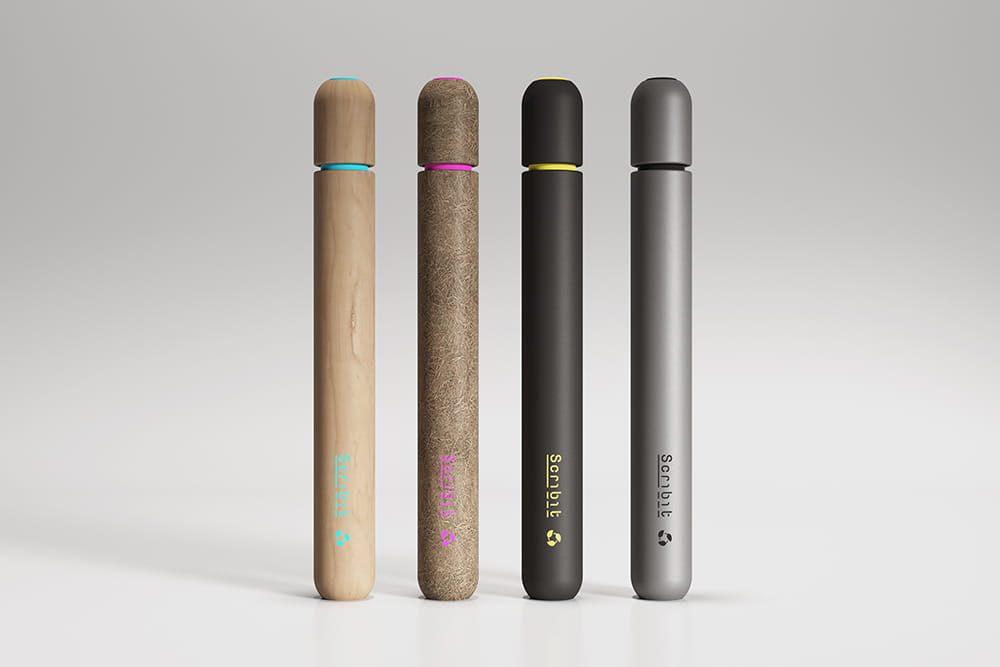
CRA unveils Scribit Pen world’s first compostable marker
Carlo Ratti Associati (CRA) unveils the design of Scribit Pen, the world's first fully compostable marker. The pen uses cartridges made of natural fibres and filled with water-based, non-toxic (even edible) ink. Scribit Pen aims to promote a transition towards sustainability and circularity in an industry that sends over 35 billion plastic markers to landfills every year.
International design and innovation company Carlo Ratti Associati has just unveiled Scribit Pen, the world's first fully compostable marker. Developed for tech company Scribit, the new pen addresses plastic pollution produced by the global marker industry. Every component of Scribit Pen is eco-friendly: the barrel composed of biodegradable plastic, the nibs and cartridges made of natural fibres, and the non-toxic (even edible) ink.


Approximately 35 billion plastic markers end up in landfills annually, an amount that could cover the island of Manhattan more than 11 times. Scribit approached CRA to develop a more sustainable marker, which might help transition the entire art supply industry toward a more environmentally friendly model.
Scribit Pen is eco-friendly in all its components. The pen barrel is available in wood, bioplastic, and anodized aluminium. Inside it lies a natural fibre ink cartridge and nib. These internal components are replaceable so that the same barrel can be used indefinitely. The water-based, non-toxic Super Washable Ink is a high performance and non-toxic to such an extent that it is certified as edible. The project aims to address Scribit's commitment to promoting a circular economy: a sustainable approach to production and consumption, which aspires to replace the "take-make-waste" linear model.
|
|

|
"We are proud of Scribit's success, and how it has empowered thousands of people around the world to change the way they draw," says Carlo Ratti, director of the MIT Senseable City Lab, who led the Scribit Pen design team: "However we were troubled by the amount of plastic produced by the markers that the robot uses. By developing the new Scribit pen, we can turn one of humankind's primordial acts – drawing – into a fully sustainable one." |
Scribit Pen follows CRA's ongoing research on circularity in product design and architecture. For example, the Italian Pavilion at Dubai Expo 2020, designed by CRA and Italo Rota with Matteo Gatto and F&M Ingegneria, employs recycled components such as orange peels coffee grounds as construction materials. Other projects include the prize-winning Circular Garden at Milan Design Week 2019, which used mycelium from mushrooms as a building material.
ABOUT CRA-CARLO RATTI ASSOCIATI
CRA-Carlo Ratti Associati is an international design and innovation practise based in Turin, Italy and New York City. Drawing on Carlo Ratti's research at the Massachusetts Institute of Technology (MIT), the office is currently involved in many projects across the globe, embracing every scale of intervention – from furniture to urban planning. Among recent projects, there is the Italian Pavilion at Expo Dubai 2021, the CapitaSpring skyscraper in Singapore, the curatorship of the "Eyes of the City" at the 2019 Bi-City Biennale of Architecture and Urbanism of Shenzhen, the redesign of the Agnelli Foundation HQ in Turin, the masterplan for Milan Innovation District (MIND). CRA is the only design firm whose works have been featured three times in TIME Magazine's "Best Inventions of the Year" list – respectively with the Digital Water Pavilion in 2007, the Copenhagen Wheel in 2014, and Scribit in 2019. In the last years, the office has been involved in the launch of Makr Shakr, a startup producing the world's first robotic bar system, and Scribit, the write&erase robot.
ABOUT SCRIBIT
Designed by CRA-Carlo Ratti Associati, the award-winning design and innovation firm led by MIT professor Carlo Ratti, Scribit is a write&erase robot that can turn any vertical surface into a low-refresh screen to display information from the web, user-generated content and art. Functioning as a "printer for walls," Scribit ushers in a new way of presenting digital content and allows the user to instantly reconfigure and personalize a vertical plane. Following one of the most successful global crowdfunding campaigns of 2018, the device is currently in mass production. In 2019, Scribit was acknowledged by Time Magazine as one of the World's Best Inventions of 2019. Scribit also runs a dedicated collection, called Scribit Originals, involving artists, scientists, philanthropists and public intellectuals, including Olafur Eliasson, Daan Roosegaarde, the Dalai Lama Centre for Ethics at MIT, the Ellen MacArthur Foundation, whose original drawings aim to spread positive messages internationally.
SUBSCRIBE TO OUR NEWSLETTER


IMAGE GALLERY
SHARE ARTICLE
COMMENTS